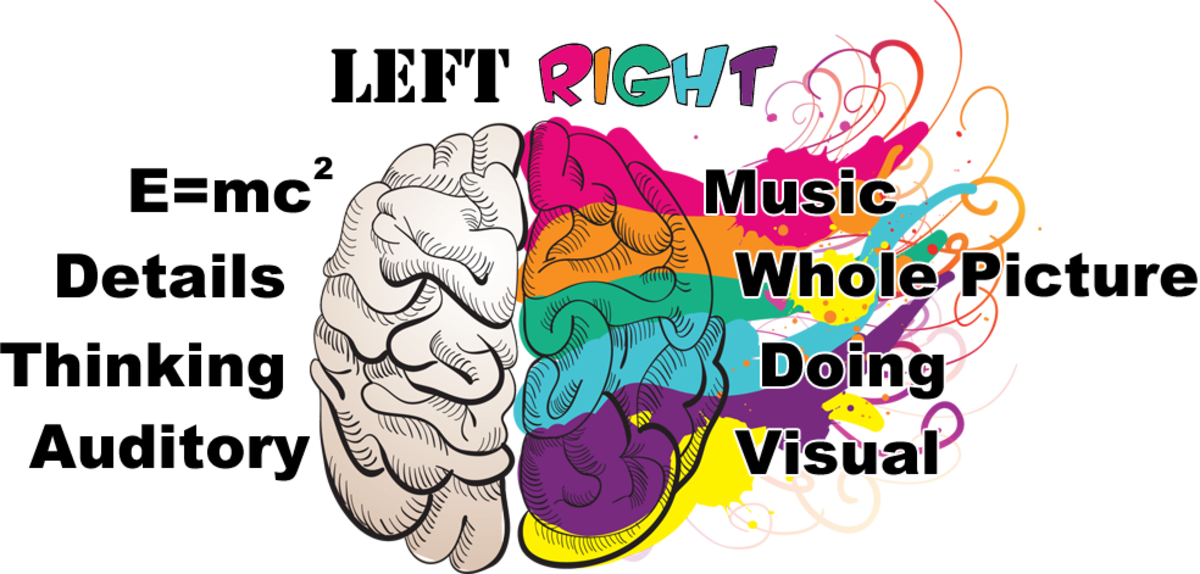Sentence Sermons (Christian Inspiration) #111 --- Conscience
Quotations on Conscience (Set No. 2)
"Let your conscience be your guide" is a mistake often spoken. The office of the conscience is not that of a guide. Nor is it one of a judge. One's feelings are no evidence of his salvation. When one says, "I feel like I am saved," he is predicating his hope of salvation on the wrong premise. A person's conscience may be perfectly clear, his feelings entirely satisfactory to himself, and yet be entirely wrong. Saul of Tarsus declared himself, before he became a Christian, "I verily thought with myself, that I ought to do many things contrary to the name of Jesus of Nazareth." If his feelings were a safe guide, then he was right in persecuting the church. But he later declared that he was "chief of sinners." The passengers of the great Titanic had a feeling of absolute safety and security, thinking it was a ship that would not sink, but with their false feeling of security, their doom was none the less of a reality. They went to the bottom of the ocean!
Motive is a predominant factor in the process of educating the conscience. Actually, thousands have been taught to believe that it is right to rob, steal, murder because such acts, as a means to an end, are justified.
All religious persecutions are the result of perverted and distorted consciences. The perversions were inspired by motives which concluded that the means to the end were justified. Men, in the name of religion and in honor of God, have resorted to robbery, persecution, and murder; their motives being to defend what they believe to be truth and destroy the opponents of that truth. The stronger the conscience, in such cases, the greater the persecution.
If such reasoning is right, then the Jews who crucified Jesus were not guilty of sin because they thought they were doing right. Saul of Tarsus was right in killing Christian men and women because he sincerely thought he was doing right. People who rob, steal, lie and deceive are not guilty of sin, because their motive is to do what they determine to be right.
No, my friend, we cannot accept such foolish reasoning. For man to contend that his conscience is a safe guide is to contend that his conscience is an infallible rule; therefore, man himself is infallible and divine. When man makes his own conscience the rule of safety, he does not worship God as God, but worships the creature rather than the Creator. To make one's conscience the standard of right and wrong is to defy the authority of Christ and dethrone God. To honor and worship God is to recognize Him only as the supreme law giver. Every man's conscience is subject to the dictates of God's will.
—David Holland, Beauregard Daily News, DeRidder, La., Jan. 22, 1993.
The conscience is an attribute of man which clearly distinguishes him from the lower animal creation. This attribute is also involved in man's rational nature. Man is a being with a conscience.
The Apostle Paul said, "O thank God, whom I serve from my forefathers in a pure conscience." (2 Timothy 1:3.) Again, "I say the truth in Christ, I lie not, my conscience bearing witness with me in the Holy Spirit, that I have great sorrow and unceasing pain in my heart." (Romans 9:1.)
A key passage with regard to the conscience is Romans 2:15. With regard to certain Gentiles he says, "their conscience bearing witness therewith, and their thoughts one with another accusing or else excusing them." We observe: (1) The face of one's conscience; (2) that the conscience is a witness bearer; (3) that the conscience commends; (4) that the conscience condemns.
The conscience is an urger, a prompter. It urges the individual to do that which he judges he ought to do, and to refrain from doing that which he judges he ought not to do. The conscience involves (1) information, (2) moral judgment, (3) the urging, (4) the action, and (5) the approval or condemnation by the conscience.
It is possible for one to have a good conscience, even in doing or in having done wrong. It is possible for one to have an offended conscience, even in doing or in having done right. It is an erroneous concept that the conscience can be or ought to be the guide. The real factor is the information. If the information is incomplete, or if it is inaccurate, then the judgment (based on that information) may be wrong. If one acts wrongly, based on erroneous information, doing what he had judged he ought to do, his conscience will approve his action (even when the action is wrong). If one does what he judges he ought not to do, then his conscience will condemn him even if what he does is right within itself.
For example, Saul persecuted the church. In all this terrible and sinful work he had a good conscience (Acts 22:1). His conscience functioned properly. But he was wrong! Where was the problem? In his information. Based on incomplete information, inaccurate information, or both, he judged that he ought to act according to his judgment. He did act according to his judgment, and his conscience approved what he did. But, what he did was wrong!
—David Holland, Beauregard Daily News, DeRidder, La., Dec. 16, 1994.
The intellectual powers are very largely influenced by the emotions. These powerful factors in our nature very seriously affect the relations in which we stand to ourselves and to others. ...
There is a great department of the emotions which holds a position of commanding authority over all our powers. We call it by the name "conscience," that "Candle of the Lord within us" of which the Holy Scriptures speak. This power is native to all humanity. ... This power lays down the axiom of moral obligation with the same absolute certainty as does the intellect and reason of those of their own sphere. We know the distinction between right and wrong as clearly as we perceive that between mathematical truth and falsehood. The properties of moral obligation are as permanent as those of the triangle or circle. ...
The conscience must be trained in the clear and sensitive use of the powers. Here is, indeed, the field of grave responsibility. Moral stains deprave the character, sap the intellect, degrade reason, enslave the will, and the poor victim falls out of the ranks and is trodden under foot. ...
Six great principles are given for our government. Three of these belong to the body. They are appetite, propensity and passion. These are benevolent gifts of God for our preservation in the world. Without them we would soon perish off the face of the earth. These natural powers are ambitious and would drive us madly to excesses. If we lose rein of these, like wild horses running without guidance, they will carry us to ruin. Three other great principles have been given us for the control and training of the appetites. They are reason, conscience and judgment. Reason, by which we determine what is true and ought to be believed; conscience, by which we decide both as to belief and practice. Hence education must take careful notice of all six powers, train each in its own appropriate sphere and thus develop the symmetry of the whole.
—Alexander C. Garrett, Dallas Morning News, Dallas, Texas, May 29, 1911.
Conscience is a sense of moral obligation or oughtness. God is in it and it is the biggest word in the world. You may place in the scale on one side silver, gold, opals, diamonds, houses and land, music and poetry, honor and even life itself and the little word ought outweighs them all. God is in it. ...
"What doth the Lord require of thee, but to do justly." (Micah 6:8.) ... God wants us to be honest, square, true, upright and equitable. We all at least can have old-fashioned, common honesty. ... The Bible declares that you shall not steal. It does not say you may steal as an individual or as a corporate body; there is no legal method of stealing according to God's rule. It does not say that you may steal from someone who can't prevent it or from someone who is ignorant of his rights. "Thou shalt not steal." (Exodus 20:15.)
Since we should respect men's rights, we should treat God fairly. What are God's rights? He is our Father; ... He has a right to expect obedience from His children. There is no greater joy than the joy of duty. ...
Be just. "Thou shalt not steal." ... It does not matter whether the goods are stolen from an individual or a corporation. It is stealing, and no legal quibble can change it. It does not allow stealing to be done by agents or with the aid of anyone. The law in the commandment is simple and to the point.
—Percy R. Knickerbocker, Dallas Morning News, Dallas, Texas, Sept. 11, 1905.
"Herein do I exercise myself and have always a conscience void of offence toward God and toward man." (Acts 24:16.)
Conscience, of course, is based upon our sense of right and wrong. It approves what appears to us a right action and condemns that which seems wrong. It is man's only guide, and his conscience never fails to warn the normal man. It is surpassingly foolish, of course, for a man to refuse to heed his conscience, for as I have already said, it is his only guide. We may defer to the judgment of others in matters as to which they should be better able to judge than we, but in matters of right and wrong the conscience must be absolutely obeyed. This, however, does not mean that the conscience is what it has been trained to be. The teachings of parents and the instructions of teachers and companions during the impressionable years of childhood and youth, the habits, thoughts and associations all through life train the conscience to look upon certain things as right and others as wrong. The conscience of the head hunter applauds his fiendish murder, and that of the sour-faced, strait-laced Puritan gives him praise for an iron discipline of himself and family that is a cruelty to them and a crime against God. The conscience of some people tells them that it is wrong to dance or to go to the theater; that of some that the use of alcohol in any form of beverage is sinful. The conscience of the persecutor applauded the burning of the heretic, etc. In short, we may say the conscience of a man is what he makes it. Every man trains his own conscience, whether he tries to do so or not. In spite of him every thought and act tends to fix upon himself his ideals of right and wrong, and conscience faithfully reproduces that state of mind or heart. It registers always what the man really thinks, the average as it were of his thoughts and acts.
There can be no higher ideal for man than that which St. Paul lays down here for himself. He tries to keep his conscience clean as toward God and toward man. He "exercises" himself with that end in view, and the result must be a strong and faithful character to whom only high ideals and noble actions will appeal.
—J.L. Patton, San Antonio Daily Express, San Antonio, Texas, Aug. 9, 1909.
To have the approval of your conscience when you are alone with your thoughts is like being in the company of true and loving friends. To merit your own self-respect gives strength of character. Conscience is the link that binds your soul to the Spirit of God.
—David O. McKay, Millennial Star, London, England, Aug. 8, 1940.
It may be said that the function of religion is to throw the searchlight of a man's conscience on his actions and give to the world a character after the model of the Golden Rule.
—Warren E. Comstock, Dallas Morning News, Dallas, Texas, May 20, 1912.
The testimony of a good conscience is the glory of a good man.
Conscience is a safe guide only when it is guided by the Word of God.
The life that is hid with Christ in God is its own defense.
—James DeForest Murch, Christian Standard, Cincinnati, Ohio, May 20, 1939.
Many a man stifles the voice of God and of conscience until it is almost useless for Christ to speak to him. He thinks he is monarch of his soul, but, like Herod, he is only a monarch of mockery. Many a man and woman is in Herod's place today. They do with slight compunction what a few months ago they would never have dreamed of doing. It was Herod the Great who was the instigator of the massacre of the innocents in Bethlehem. Herod had become despiritualized. He had stifled his best instincts.
—Herbert J. Root, Milwaukee Journal, Milwaukee, Wis., March 22, 1926.
Conscience is that incorruptible warrior who guards with zealous care the temple called our hearts.
—Billy Sunday, The Atlanta Constitution, Atlanta, Ga., Nov. 23, 1917.
The life of faith under the law of conscience implies cooperation with others. The faith that is genuine may be unaffected by scruples in minute matters but moral quality is relative rather than absolute, requiring not only that one be right with God but also right with his own conscience. For he cannot have peace of mine unless he does what his own heart knows to be right. Of course when he is right with God and himself he will certainly sustain the right relation to his fellowmen. The doubt that is sincere must not be despised or defied. Let no man throttle his conscience. That conscience may be warped and wrong, but it is his guide and he ought to obey it. If he does what his conscience condemns he commits sin and he experiences in himself all the reactions of committing a sin. Thus a man is a liar if he tells a truth believing it to be a lie. So a man is a sinner when he commits a deed he believes to be a sin even if another man can and does do the same thing without the same effect.
—Finley W. Tinnen, Baptist Message, Shreveport, La., June 18, 1931
A man is conscientious in the measure that he holds fast to the word of God. And speaking of a "good conscience" does not imply that a man denies that he ever does any wrong, but in that he will be corrected when he is in the wrong and will never repeat his wrongdoings.
When our conscience accuses us of an evil deed we should not hush it or smother its voice. No, we should listen to its verdict when it condemns us. But then we should appeal from conscience to Christ. Our conscience, enlightened by the moral law of God, is the seat of justice, but Christ is the seat of mercy. But this appeal should not be done in the same spirit as when a man appeals from one court to another.
When a man appeals from a lower to a higher court, it is under the supposition that the lower court made a mistake in passing its verdict. We should accept the verdict of our conscience and acknowledge its justice, and for that reason appeal to the court of mercy in Jesus Christ, whom God hath set forth to be a propitiation, to declare His righteousness, for the remission of sins.
God has established the court of mercy for those who are condemned by the court of justice that they may appeal He did this in promising: "Whoever shall call upon the name of the Lord shall be saved."
—A.P. Westerberg, The Register and Leader, Des Moines, Iowa, Dec. 4, 1911.
Conscience is God-given but needs regeneration, nourishing, spiritual cultivation, and biblical education. Then it will be a wonderful moral guide. It will point toward the will of God like the magnetic needle points toward the magnetic north pole.
—W.R. White, Baptist Standard, Dallas, Texas, Aug. 30, 1967.
Conscience is an affinity in man's soul for the moral principle of the universe. Yes, there is a sense in which conscience is the voice of God in the soul. It may be warped and misdirected, but it has an affinity for morality which can be educated and developed. But it is not the creation of education although it may be the beneficiary or victim of the same. Like a magnet which may be deflected and frustrated, but springs back toward the pole when given a chance, conscience is restless for conformity to moral principle. It readily responds to moral truth when given a chance. I am talking about conscience, not human nature. They are often in conflict.
—W.R. White, The Sunday School Builder, Nashville, Tenn., March 1956.
Self-knowledge is the battlefield of the soul, man's silent oracle. Conscience is the whispering of God, God in man. Conscience is the eye of the soul. It is the mill of the gods, it is the invisible ruler. ...
Guilty men find in this omnipresent something a thing to dread, a thing that compels recognition of God. Many never seem to be troubled, but indifference is only assumed. With them mirth is only art, music no harmony, laughter no joy.
Conscience is like a judicious parent, never whipping when excitement is on. When business and pleasure are rushing, conscience goes right on posting its book. When the guest day comes the life record is thrown open for inspection. ...
One says: "I will do what I think all I need to do." You can go straight to hell doing that. We are not to do what we think is right, but what God's word says is right, for His book is the standard that our conscience must be educated by. It makes a difference by what kind of standard our conscience is trained. It makes a difference whether our conscience is trained by the standard of the red light of sin or by the standard of Him who spake never as men spoke.
Conscience puts a man on trial to do what he thinks is right. God's word, the standard, puts him on trial to do what is right.
—W.H. Williams, Dallas Morning News, Dallas, Texas, Sept. 4, 1907.
"Be sure your sins will find you out." Sin always finds the sinner out. It is a haunting spectre that will not drown; an accusing voice that cannot be drowned in the revelry of night. Sin records itself upon the conscience. Whatever conscience is, it has never once praised a David when sinning against what he believed to be the law of right and never once has it condemned a Daniel for doing what he thought was the law of right. In this sense conscience is infallible and is the voice of God. ...
It is true that conscience scourges the sinner and points out wrong, but it also points out the path of rectitude and gives a man a chance to retrace his steps. Conscience may be a path by which a sinner may climb to sainthood.
—William Wilson, Milwaukee Sentinel, Milwaukee, Wis., Oct. 17, 1921.
Those who will wrong their consciences for anything will come at length to do it next for nothing.
—L.S. Winham, The Baptist Chronicle, Alexandria, La., July 11, 1912.
The repetition of a sin dulls the edge of conscience.
—Ernest C. Wareing, Western Christian Advocate, Cincinnati, Ohio, Oct. 23, 1924.
The best private secretary I know of is something called conscience.
—George J. Weber, Salt Lake Tribune, Salt Lake City, Utah, Feb. 9, 1951.
Conscience never makes cowards of us until we turn our backs on it.
—Henry F. Cope, Chicago Tribune, Chicago, Ill., May 19, 1907.
The hardened conscience is the one trampled down by many compromises.
—Henry F. Cope, Chicago Tribune, Chicago, Ill., Nov. 29, 1908.
A seared conscience is like tanned leather; it is there but it does not feel.
—F.R. Eddy, Wesleyan Young People's Journal, Syracuse, N.Y., March 1937.
Our consciences are very elastic, but the nearer we get to the Lord the less elastic our consciences grow to be.
—Heber J. Grant, Utah Enquirer, Provo, Utah, Sept. 4, 1888.
Conscience can be a wonderful friend or a terrible accuser.
—Roy L. Smith, Christian Advocate, Chicago, Ill., Aug. 29, 1946.







